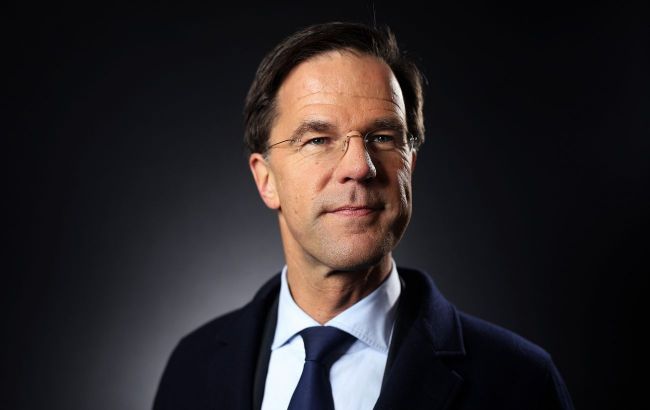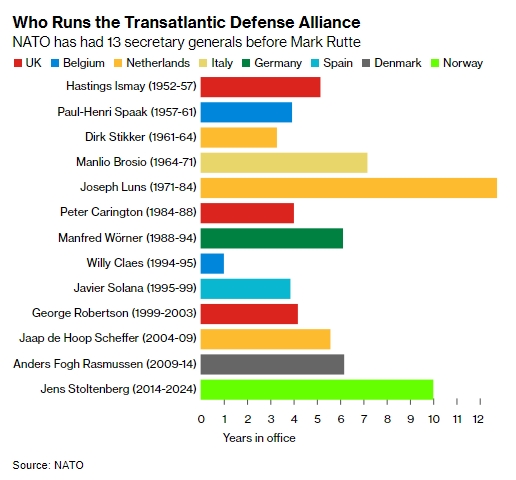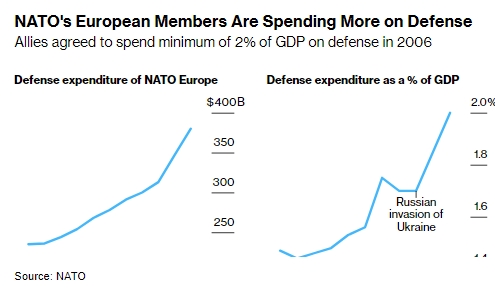NATO is headed by Ukraine supporter who can handle Trump
 Mark Rutte (Getty Images)
Mark Rutte (Getty Images)
Mark Rutte will officially become the Secretary General of the North Atlantic Treaty Organization (NATO) on October 1. He is a staunch supporter of Ukraine and brings experience in handling confrontations with Donald Trump, according to Bloomberg.
If Trump wins the US presidential election in November, transatlantic support could be jeopardized, posing an existential threat to the alliance founded in 1949. This would destabilize Europe's security architecture, especially as Russia's war against Ukraine is now in its third year, and Kyiv depends on a continuous flow of military and financial aid for its defense.
Rutte will also have to navigate pressures from some members calling for more focus on counterterrorism and strengthening NATO’s southern flank while maintaining defense spending at levels sufficient to ensure reliable deterrence, particularly with tight budgets in countries like Germany.
This contrasts with 2014, when Rutte’s predecessor Jens Stoltenberg received a warning from his predecessor that "boring years" lay ahead in managing the Brussels-based organization.

www.bloomberg.com
Experience in dealing with Trump
Known for his communication skills, Rutte—a former human resources manager turned politician—has demonstrated his ability to handle complex situations. After nearly 14 years leading the Dutch government, he has a wide network of contacts to rely on.
"He knows the EU and all its leaders by heart. And he has dealt with Trump," said Camille Grand, an analyst at the European Council on Foreign Relations and a former senior NATO official. "Politically, he will hit the ground running."
His reputation for handling Trump could be particularly valuable. Before his first meeting with the then-US president in 2018, Rutte was determined to build a relationship while standing his ground, reportedly practicing handshakes and studying Trump's habit of putting people on the spot, according to a source familiar with the matter.
The former Dutch leader seemingly maintained good working relations with Trump, unlike many other European leaders. The key was careful planning and preparation, said people close to the matter.
One meeting stands out. During a tense 2018 summit, when Trump threatened to withdraw from NATO if European countries didn’t increase defense spending, Rutte managed to defuse the tension by stating that European allies had indeed stepped up—and credited Trump for it. Though the reality was questionable at best, the move changed the atmosphere and allowed Trump to claim a victory.

www.bloomberg.com
Since then, Rutte hasn’t deviated from this approach, stating in an interview with Bloomberg TV in January that Trump was right to criticize Europe’s defense spending. When asked about a possible second Trump term, he added, "We have to dance with whoever is on the dance floor."
Rutte echoed a similar sentiment at this year’s Munich Security Conference, urging Europeans to "stop moaning and whining" about Trump’s potential return.
However, his stance on Trump might shift, especially given that Rutte owes much of his current position to Joe Biden. The Trump opponent repeatedly encouraged the Dutchman to take the helm at NATO. One offer came in 2022, which Rutte declined to remain in power in the Netherlands. But after his coalition collapsed a year later, it opened the door for a new move.
Support for Ukraine
Bloomberg writes that Ukraine could be a tougher point of contention. While Trump has openly criticized aid to Ukraine, Rutte is a fervent supporter of Kyiv. This stance partly stems from his emotional response to the downing of Malaysia Airlines Flight 17 in 2014, which killed around 200 Dutch citizens due to Russian involvement.
"There has never been anything bigger and this will always remain number one by far in the 14 years that I have been doing this job," he said on a Dutch radio show earlier this year.
Despite this conviction, the Netherlands has not provided as much aid as some other European countries, ranking ninth in terms of support for Kyiv as a percentage of national economy. The country also crossed NATO's spending threshold of at least 2% of GDP on defense this year, partly due to the complexities of its fractured coalition.
Despite domestic constraints, Rutte remains a key player on the international stage. He played a crucial role in persuading the US to agree to send F-16 jets to bolster Ukraine’s defense. The Netherlands plans to deliver 24 fighter jets to Kyiv and provide 18 more for training.
Rutte’s career
A talented pianist, Rutte originally aspired to a music career but eventually graduated in history and started in the human resources department of consumer goods company Unilever. He later turned to full-time politics after playing an active role in the youth wing of the right-leaning VVD party, known as the Dutch liberals.
His survival skills were often tested during his tenure. In January 2021, his third cabinet collapsed over a scandal involving Dutch childcare subsidies. Tax authorities had falsely accused families of fraud, leaving thousands of Dutch households in poverty.
He managed to recover, securing another term in early elections later that year. However, his fourth cabinet fell apart last year over internal divisions on migration policy, prompting Rutte to decide to leave national politics.
During his long tenure as head of the Netherlands, Rutte became known for embodying Dutch pragmatism and thrift, rejecting the trappings of high office.
Famous for biking around or driving a second-hand Saab in The Hague, he was known for paying for his own coffee and refusing reimbursement for work-related expenses. He also taught social studies at a high school in his hometown during his premiership and reportedly continued his weekly classes even after his cabinet collapsed in 2023.
According to informed sources, this modest style has carried over to NATO, where he declined the usual security services provided to secretaries general.
The NATO job wasn’t his first choice after stepping down from Dutch politics. Initially, he aimed for the presidency of the European Commission but withdrew after it became clear that Ursula von der Leyen would seek a second term.
Even then, the NATO post wasn’t guaranteed. Romanian President Klaus Iohannis was also in the race and was supported by Eastern Europeans, who were initially hesitant to back Rutte over concerns about balance in the alliance. He’ll need to tread carefully to navigate these feelings.
During Stoltenberg’s 10-year tenure, formerly neutral Finland and Sweden joined NATO following the invasion of Ukraine, joining Montenegro and North Macedonia as new members. There’s also been increased defense spending by allies and access to 500,000 combat-ready troops. This provides Rutte with a solid foundation to manage future risks.
"The last 10 years have seen a fundamental transformation at NATO," said Oana Lungescu, an analyst at London’s RUSI think tank and former NATO spokesperson. "It has the most robust defense plans since the Cold War."
To recap, on October 1, Mark Rutte officially assumes the position of NATO Secretary General, succeeding Jens Stoltenberg, who led the alliance for the past decade.

